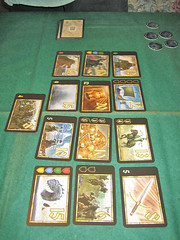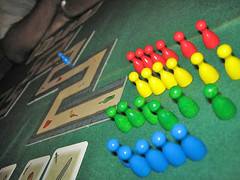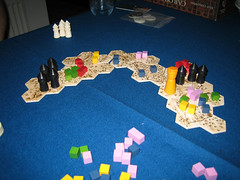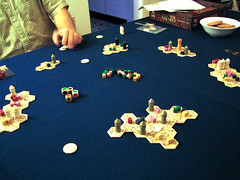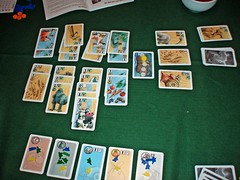King Arthur
Next up was King Arthur, Reiner Knizia’s cardgame of the boardgame. Not knowing anything about the boardgame I don’t know if this bears any resemblence or not. Nobody had played before apart from me, I had played a couple of times with the wife so had a basic idea of what was going on. Not enough as it turns out as we managed to ignore a couple of the advanced rules.....ah well next time we play we will get it right. Steve was reading through the rules and found a couple of things we weren't doing but it was too late to change by then.
In this game there a number of quests, ie cards which have a number of victory points on them, and a cost, either points or colour, to obtain. There is a deck of knight cards and an adversary deck. You lay out adversary cards and use the knight cards in your hand to defeat them. Each adversary card has a points value and a colour, you use these to complete quests. In your turn you can, turn over adversary cards if there is not at least 4 of one colour, use your knights to defeat adversaries, use your adversary cards to complete quests. If you do nothing you draw 2 cards from the knights decks otherwise you draw one.
To defeat an adversary you play knight cards of the same colour equal to the value on the adversary card, you then place one of your seals on it. You only pick up this card when all adversaries of that colour have seals on them. To complete a quest you use adversary cards that meet the cost on the quest. Basically quite straightforward to play, but it does give you a few interesting decisions to make. You can see which adversary cards your opponents have in front of them and can try to deny them cards that will enable them to complete a quest, while trying to obtain adversary cards to complete quests of your own.
The rules we didn't use were you can defeat an adversary you have defeated before to pick it up immediately or play double the knight cards required to pick it up immediately. One other rule which I found later on the geek is that adversary cards left in your hand at the game end count towards your points score (sorry chaps!!), this would have made a difference to the results.
Final Scores for 2 games
Steve 42, Colin 38, Garry 35, Richard 29
Richard 41, Garry 41, Steve 30, Colin 27
I think we all enjoyed it and would willingly play again, with all the rules this time :)
Happy Gaming!!!
